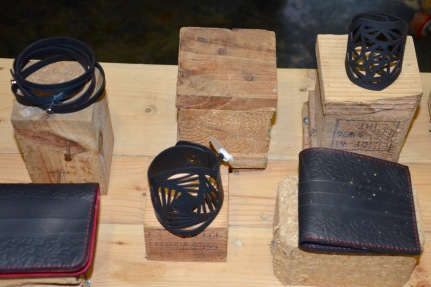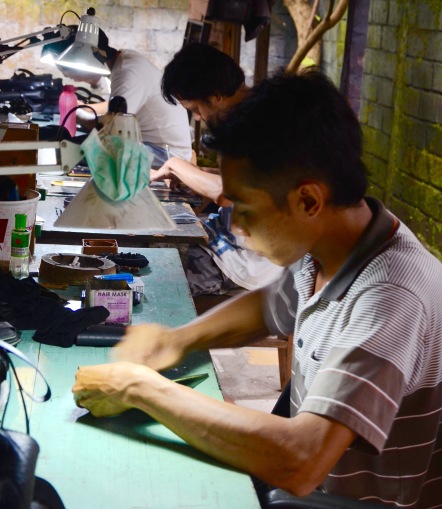waste
SEMAR–Sickening–Endless–Makes money–Artificial–Reduce
(…in each edition we try to find some words that are related to the overall topic- this time plastic and waste….)
While I was looking for an environmental organisation in the area, friends recommended that I drive to Salatiga. After a drive through the breathtaking scenery at the foot of Mount Merbabu, I meet members of SAPU and Komunitas TUK. In a traditional Joglo, I am welcomed by Ayok and Rudy, two of the founding members of TUK. I can’t resist checking out their little show room, where upcycled jewellery, bags and accessories are on display.

In the backyard, I see and hear people working on sewing machines, which were modified by Ayok. Here, SAPU makes products, produces art and fashions messages from used inner tubes/ tyres, used oil drums, recycled trash, other used objects, plastic bottles, old magazines, second hand clothing and anything that can be turned into something useful and stylish.
Combined efforts to make a difference
“Sapu”, I wonder, “isn’t this a traditional Javanese broom?”
“Exactly”, laughs Ayuk. “It is made from a bundle of coconut sticks tied up together. This effective and strong tool works only by the combination of its single sticks. Likewise, SAPU believes that only in combination can this collective of craftspeople, designers, friends, sewers, trash collectors, artists, musicians, scientists, farmers and writers from Central Java, Indonesia and Australia be creative, productive and, above all, make a difference”.
All of their items are produced and distributed in ethical and socially responsible ways. The 14 employees receive the minimum salary plus transport support and a bonus. They are insured and have fixed working hours.

Inspire people- here and abroad
So far, most of the products have been sold to foreigners in Yogya and Bali or abroad. Only 25% are bought by Indonesians. It is not necessarily a matter of the price, as many items that are being sold in malls are more expensive and still bought by many. It is rather that upcycled items are not considered “hip” yet. In addition, neither the products nor the ideas behind them – to conserve nature and reuse material – are widely known and supported.
“Our aims are not confined to the creation of beautiful objects. Through our work, we see the chance to inspire people to live a more sustainable way of life and to care for their own environment. We hope to inspire environmental change by changing the attitudes and behaviour of all those who come into contact with a SAPU product.”
It all started with a river clean up
Most of the material SAPU uses now is purchased from waste sorting (bank sampah) stations. However, it all started in 2006 with material collected at a river clean up. One artist created a wallet out of the plastic waste collected. The clean up was part of a yearly festival, called Festival Mata Air. Through connecting art and activism, the group of environmentally concerned artists and volunteers advocates on issues concerning the environment and especially water conservation. “We believe that to plant an environmental ideology is as important as planting trees itself” says Rudy, one of the founding members. So, in addition to exhibitions, environmental forums, reforestation and workshops, they also organised clean ups of rivers and springs.
This idea developed and more and more energy flew into creating something new out of materials that had already been used and would otherwise be thrown away. “We see possibilities in items which the majority of us would consider to be waste.” says Ayok, the designer and creative head of SAPU. In 2010 SAPU and TUK separated into profit and non-profit sections, but they are still closely interlinked.
The process of change begins

TUK creates toys out of reused material, often with kids themselves. I was surprised to hear that they even created a whole playground from old car tyres, inner tubes and other used materials. Occasions like this, when something new is created out of something old, are typically used to share knowledge about the local and global environment. “Our campaigns aim to make people start thinking! This is where the process of change begins.” states Rudy.
Moreover, workshops at schools (even in Australia) or for the sustainable travel agent Viavia are good opportunities to generate income. All TUK members work voluntarily, but money is still needed to remain operational.. Most of the activities that TUK are involved in are funded by friends that chip in whenever money is needed. Sometimes there is a donor for the yearly environmental art festival “Mata Air”, that reaches out to thousands of people. In addition, a percentage of the funds from what SAPU sells is used to fund TUK’s environmental activities.
Current projects are the setting up of a bank sampah and library in Salatiga and the experiment of creating an (almost) fully self-contained house to set an example and inspire others. Additionally, a new workshop was just opened in Ubud, Bali, where next year’s Festival Mata Air will take place.

It remains in our hands
I mention that I am very much impressed with what has been achieved and how inspired I am by the unique and uplifting atmosphere that you can feel when you enter the premises. In my opinion however, it should be a task of the local government to support waste reduction and make sure that people take care of the environment. “The local government occasionally supports our actions” sighs Rudy. But mostly they are not interested or try to put half of the budget allocated for a workshop they asked us to run in their own pockets. “You can’t count on the government when it comes to protecting the environment. We don’t even have a Green Party in this country. It’s a joke!”
So it remains in our hands to spread the word! Please share this article if you like it!
We will have a little series of blogs related to plastic and waste that will be published soon. Stay tuned!

One thought on “Upcycling as a statement”